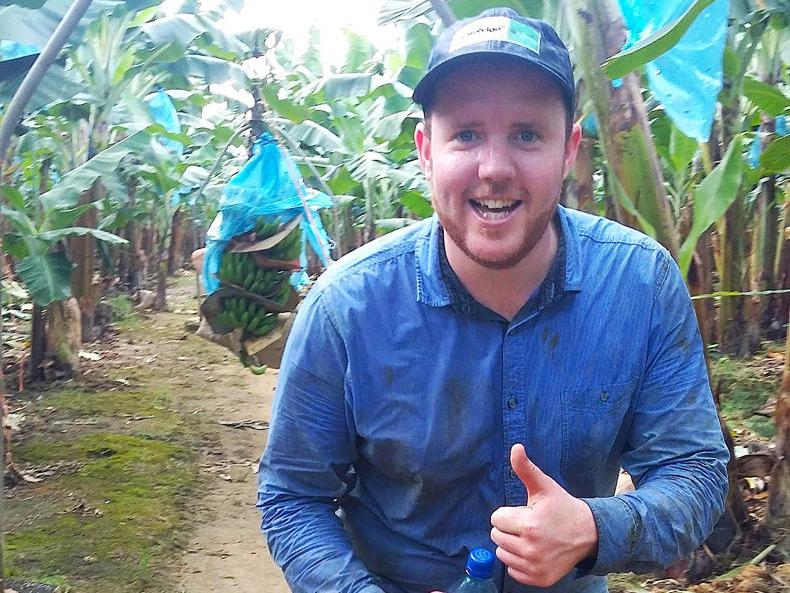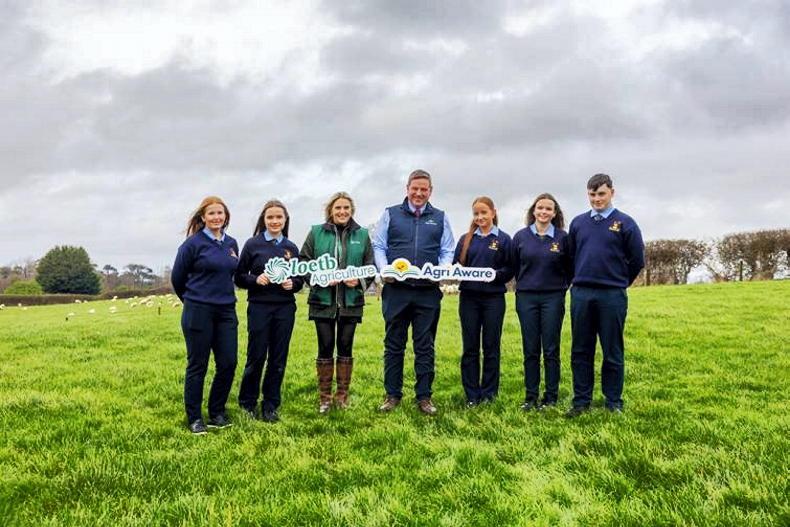As forest cover and timber production levels began to increase, interest in the undergraduate degree courses in forestry seemed to wane. So the Forestry Careers Ireland (FCI) initiative was set up to spread the word among transition-year students about the career options available within forestry both in Ireland and abroad.
“Applications to study Forestry in University College Dublin (UCD) and Waterford Institute of Technology (WIT) have not kept pace with the expansion of the sector. FCI would like to increase both the quantity and quality of application numbers applying to forestry courses based on the current and anticipated demand for Forestry graduates,” says Marie Doyle from the forestry department at UCD.
The FCI initiative is a sector-wide approach to promoting forestry as a career. The main members are UCD, WIT, Teagasc Ballyhaise, Teagasc Forestry, Sustainable & Responsible Investment Forum (SIF), Veon, Coillte, Balcas and the forestry division in DAFM.
The initiative came together as the industry was experiencing difficulties in attracting sufficient numbers of high quality forestry graduates.
“The management of Irish forests has become more holistic in nature and forest owners have several objectives for their forest areas that extend well beyond the attractive financial gains that can be made – this has made forest management more interesting, more challenging and more sustainable and provides many opportunities for graduates,” Marie says.
Three organisations currently provide forestry education and skills training courses in Ireland. These courses are full time.
1 Teagasc awards the Level 5 certificate in forestry and Level 6 advanced certificate in forestry.
2 WIT awards the Level 7 bachelor of science in forestry and Level 8 bachelor of science in land management in forestry.
3 UCD awards the Level 8 bachelor of agricultural science in forestry.
Forester focus: Alan Farrelly, West Cork and Kerry, Green Belt

Alan Farelly, Green Belt.
I’ve been a forester for Green Belt covering west Cork and south Kerry for the last 12 years. I was a client for Green Belt first as I planted some ground when I was younger. I’m also suckler farming. I have a degree in marketing management from University College Cork (UCC). Green Belt asked me to join their team having been a client of theirs for a few years.
The job satisfaction of being a forester is great. On a normal day I could be on the road from 7am to get to appointments with landowners, meet a lorry load of trees somewhere or to check in on an active job. It’s very rewarding because you’re dealing with nice people. Not every salesman can go into a farmer and make them better off.
In the beef game a very good farmer is only breaking even. For most farmers with poorer land the most economically viable thing to do is to plant it. It used to be mostly farmers that were planting, but since they changed the premium system there are now more investors coming into the forestry business. You also see international companies buying forestry in Ireland.
Monocultures of spruce is now a thing of the past and new plantations have 15% broadleaves mixed in with them. Green Belt is now planting about 50:50 native woodland and spruce in the Cork and Kerry region. However, in my opinion the farmer should be allowed to plant whatever species they want on their own land. You’ll never really get a clearfell income from native woodland, but you will get a higher premium. Green Belt and Microsoft pioneered the Woodland Expansion Fund which gives landowners a top up for planting native woodlands and it is still available. It’s an add-on to the Department scheme. The top up is worth an additional €1,000/ha and is now supported by other large companies seeking to improve their carbon footprint.
The one drawback to working in forestry is the beauracracy and inefficiencies in the licensing process which has caused industry wide frustration. I know Coillte had to cancel two of its timber auctions this year because of it which has caused a shortage of timber to the mills. It can take anything from three months to two years to get a license for planting or felling.
Ireland is way off its planting targets due to inefficiencies and beauracracy; people get disillusioned when it takes so long to get approval and circumstances may change. When a farmer wants to plant, let them plant.
Forester focus: Jason Meenaghan, ripening and
distribution operations manager for Fyffes, Jiangsu, China

Jason Meenaghan, Fyffes graduate.
Deciding on a career path for some people at an early age is easy and for others it takes a few goes, I’d be the latter. After leaving home (Belmullet, Co Mayo) at 17 for university, I studied analytical science for three years in Dublin City University (DCU) before finding myself in bar-management where I’d spend the next six years.
It was at this stage I decided to return to college, but what to study? I called on the professional advice of career guidance councillor Marie McManamon. UCD forestry management stood out for me as the perfect course. I could see myself using my managerial skills obtained whilst working in the bar trade coupled with my passion for outdoor work and farming. My choice in UCD was solidified when I was able to study an elective module throughout my degree. I was always fascinated with the Chinese language and thus this was my elective choice.
UCD school of agriculture offers students the opportunity in your third year to study abroad. I spent a semester at Michigan State University in the US. This was a fantastic opportunity to compare forestry practices on two different continents. For my professional work experience I spent five months in the University of California Berkeley, based in the forest research centre way up in the Sierra Nevada Mountain ranges, and in Kings Canyon National park working on Giant Redwood Sequoiadendron giganteum.
“In fourth year at UCD you are advised to start thinking about careers post-graduation. I drew up some CVs and was prepared for interviews. In fact, I went as far as Stirling in Scotland for an interview with Tilhill forestry management company.
Closer to graduation, I attended the Irish Farmers Journal agri careers fair in the RDS where I met with several forestry and agricultural companies and discussed possible job opportunities. I stumbled upon the Fyffes stand and got chatting to UCD graduates employed with them.
Fyffes is one of the world’s largest fruit companies with the head office in Dublin. The Fyffes businesses spread throughout the northern, southern and European continents. It has worldwide operations, growing, sourcing, shipping, ripening, distributing and marketing bananas, pineapples, melons, mushrooms and avocados. And of course it is a good career accelerator. China – where I’m currently based – is developing quickly and has a large market and development potential for Fyffes.
I started on the Fyffes graduate programme in Belize in Central America and from there went to Peru and Ecuador in South America. I undertook a planting and harvesting programme from seed to fruit harvesting, where there were many similarities to forestry. I then returned to Europe and spent time at Fyffes ripening and distribution centres in Ireland and the UK. From there, I set out for China and have been here almost three years now.
If you like working outdoors coupled with office work, geographic information system (GIS, remote sensing), the UCD course is amazing; it covers everything such as the underlying contextual sciences through forest management, plant health and much more.
To all those thinking of attending university I have this to say: we are a great nation of thinkers – we think a lot about what others think about us. Use this tool to think about what you really want as a career. Where you would like to be in 10 years’ time? Focus on it and go for it.
I’d recommend all students to take up a language (as a minor) to a level recognised by employers by completion of their degree. It opens so many avenues come graduation time. It may pull down your GPA a little bit, but you’ll stand out.
Read more
Farmers asked to consider 30m forestry strips along watercourses
Emergency licence legislation required as FAC overwhelmed
As forest cover and timber production levels began to increase, interest in the undergraduate degree courses in forestry seemed to wane. So the Forestry Careers Ireland (FCI) initiative was set up to spread the word among transition-year students about the career options available within forestry both in Ireland and abroad.
“Applications to study Forestry in University College Dublin (UCD) and Waterford Institute of Technology (WIT) have not kept pace with the expansion of the sector. FCI would like to increase both the quantity and quality of application numbers applying to forestry courses based on the current and anticipated demand for Forestry graduates,” says Marie Doyle from the forestry department at UCD.
The FCI initiative is a sector-wide approach to promoting forestry as a career. The main members are UCD, WIT, Teagasc Ballyhaise, Teagasc Forestry, Sustainable & Responsible Investment Forum (SIF), Veon, Coillte, Balcas and the forestry division in DAFM.
The initiative came together as the industry was experiencing difficulties in attracting sufficient numbers of high quality forestry graduates.
“The management of Irish forests has become more holistic in nature and forest owners have several objectives for their forest areas that extend well beyond the attractive financial gains that can be made – this has made forest management more interesting, more challenging and more sustainable and provides many opportunities for graduates,” Marie says.
Three organisations currently provide forestry education and skills training courses in Ireland. These courses are full time.
1 Teagasc awards the Level 5 certificate in forestry and Level 6 advanced certificate in forestry.
2 WIT awards the Level 7 bachelor of science in forestry and Level 8 bachelor of science in land management in forestry.
3 UCD awards the Level 8 bachelor of agricultural science in forestry.
Forester focus: Alan Farrelly, West Cork and Kerry, Green Belt

Alan Farelly, Green Belt.
I’ve been a forester for Green Belt covering west Cork and south Kerry for the last 12 years. I was a client for Green Belt first as I planted some ground when I was younger. I’m also suckler farming. I have a degree in marketing management from University College Cork (UCC). Green Belt asked me to join their team having been a client of theirs for a few years.
The job satisfaction of being a forester is great. On a normal day I could be on the road from 7am to get to appointments with landowners, meet a lorry load of trees somewhere or to check in on an active job. It’s very rewarding because you’re dealing with nice people. Not every salesman can go into a farmer and make them better off.
In the beef game a very good farmer is only breaking even. For most farmers with poorer land the most economically viable thing to do is to plant it. It used to be mostly farmers that were planting, but since they changed the premium system there are now more investors coming into the forestry business. You also see international companies buying forestry in Ireland.
Monocultures of spruce is now a thing of the past and new plantations have 15% broadleaves mixed in with them. Green Belt is now planting about 50:50 native woodland and spruce in the Cork and Kerry region. However, in my opinion the farmer should be allowed to plant whatever species they want on their own land. You’ll never really get a clearfell income from native woodland, but you will get a higher premium. Green Belt and Microsoft pioneered the Woodland Expansion Fund which gives landowners a top up for planting native woodlands and it is still available. It’s an add-on to the Department scheme. The top up is worth an additional €1,000/ha and is now supported by other large companies seeking to improve their carbon footprint.
The one drawback to working in forestry is the beauracracy and inefficiencies in the licensing process which has caused industry wide frustration. I know Coillte had to cancel two of its timber auctions this year because of it which has caused a shortage of timber to the mills. It can take anything from three months to two years to get a license for planting or felling.
Ireland is way off its planting targets due to inefficiencies and beauracracy; people get disillusioned when it takes so long to get approval and circumstances may change. When a farmer wants to plant, let them plant.
Forester focus: Jason Meenaghan, ripening and
distribution operations manager for Fyffes, Jiangsu, China

Jason Meenaghan, Fyffes graduate.
Deciding on a career path for some people at an early age is easy and for others it takes a few goes, I’d be the latter. After leaving home (Belmullet, Co Mayo) at 17 for university, I studied analytical science for three years in Dublin City University (DCU) before finding myself in bar-management where I’d spend the next six years.
It was at this stage I decided to return to college, but what to study? I called on the professional advice of career guidance councillor Marie McManamon. UCD forestry management stood out for me as the perfect course. I could see myself using my managerial skills obtained whilst working in the bar trade coupled with my passion for outdoor work and farming. My choice in UCD was solidified when I was able to study an elective module throughout my degree. I was always fascinated with the Chinese language and thus this was my elective choice.
UCD school of agriculture offers students the opportunity in your third year to study abroad. I spent a semester at Michigan State University in the US. This was a fantastic opportunity to compare forestry practices on two different continents. For my professional work experience I spent five months in the University of California Berkeley, based in the forest research centre way up in the Sierra Nevada Mountain ranges, and in Kings Canyon National park working on Giant Redwood Sequoiadendron giganteum.
“In fourth year at UCD you are advised to start thinking about careers post-graduation. I drew up some CVs and was prepared for interviews. In fact, I went as far as Stirling in Scotland for an interview with Tilhill forestry management company.
Closer to graduation, I attended the Irish Farmers Journal agri careers fair in the RDS where I met with several forestry and agricultural companies and discussed possible job opportunities. I stumbled upon the Fyffes stand and got chatting to UCD graduates employed with them.
Fyffes is one of the world’s largest fruit companies with the head office in Dublin. The Fyffes businesses spread throughout the northern, southern and European continents. It has worldwide operations, growing, sourcing, shipping, ripening, distributing and marketing bananas, pineapples, melons, mushrooms and avocados. And of course it is a good career accelerator. China – where I’m currently based – is developing quickly and has a large market and development potential for Fyffes.
I started on the Fyffes graduate programme in Belize in Central America and from there went to Peru and Ecuador in South America. I undertook a planting and harvesting programme from seed to fruit harvesting, where there were many similarities to forestry. I then returned to Europe and spent time at Fyffes ripening and distribution centres in Ireland and the UK. From there, I set out for China and have been here almost three years now.
If you like working outdoors coupled with office work, geographic information system (GIS, remote sensing), the UCD course is amazing; it covers everything such as the underlying contextual sciences through forest management, plant health and much more.
To all those thinking of attending university I have this to say: we are a great nation of thinkers – we think a lot about what others think about us. Use this tool to think about what you really want as a career. Where you would like to be in 10 years’ time? Focus on it and go for it.
I’d recommend all students to take up a language (as a minor) to a level recognised by employers by completion of their degree. It opens so many avenues come graduation time. It may pull down your GPA a little bit, but you’ll stand out.
Read more
Farmers asked to consider 30m forestry strips along watercourses
Emergency licence legislation required as FAC overwhelmed











SHARING OPTIONS